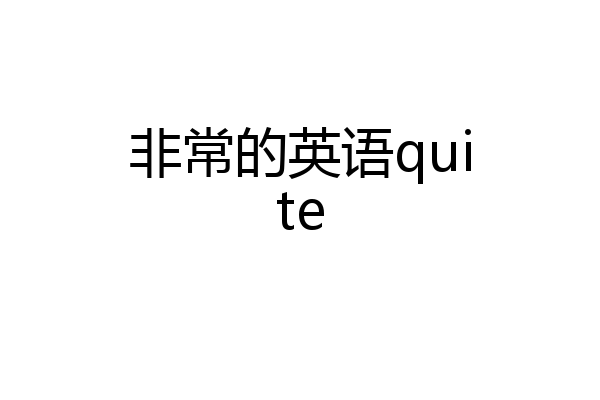
傻大明白
quite[英][kwaɪt][美][kwaɪt]adv.非常; 相当,很; 确实如此; 以上结果来自金山词霸例句:1.I think my english is quite fluent. 我认为我的英语相当流利


婕哥大王
“quite”与“very”辨析 quite和very都可以表示“非常”,是英语中使用频率很高的两个表示程度的副词。现对这两个词的用法加以辨析,以便英语学习者能够更好地掌握并运用quite和very。 1. quite可以修饰没有等级之分的形容词,例如perfect(完美的),impossible(不可能的),right(正确的),certain(肯定的),sure(确信的),ready(准备好的)等等,而这些词不可以用very来修饰。quite在修饰此类形容词时,可以译为“完全;绝对”。例如: He is quite right. 他完全正确。Their opinions are quite opposite. 他们的观点完全相反。 Are you quite ready? 你全准备好了吗? It is quite impossible to get there in three hours. 三个小时到达那里是完全不可能的。 He stood there quite still. 他一动不动地站在那里。 2. 有等级之分的形容词或副词则既可以用quite修饰,也可以用very修饰,但表达的意义有所区别。quite是减弱语,减弱所修饰的词的程度,一般译为“比较„„”;而very则加强其所修饰的词的程度,可译为“很;非常”。例如: The room is quite comfortable. 这个房间比较舒适。 He was very unhappy when he lost his dog. 他丢失狗时非常难受。 It is very hot today, but yesterday it was quite cool. 今天很热,可昨天比较凉快。 He is quite tall, but not very tall. 他比较高,可不是很高。 His work is quite good, but hers is very good. 他的工作干得比较好,而她的工作干得非常好。 3. quite可以修饰动词和过去分词,而very却不可以。例如: Have you quite finished your dinner? 你把饭吃完了吗?She quite likes him, but not enough to marry him. 她相当喜欢他,可还不到嫁给他的程度。Now she quite enjoys her job. 现在她很喜欢自己的工作。 He is quite drunk. 他确实喝多了。 4. very通常放在不定冠词a/ an之后,而quite位置却比较灵活。例如: She is quite a lovely girl. 她真是个可爱的女孩。 We had a quite good time. 我们玩得相当开心。 He is a very handsome boy. 他是个很英俊的男孩。 It was a very cold morning. 那是个非常寒冷的早晨。 5.quite可以修饰a lot,a few,a little,a bit等含有不定冠词的短语,而very不可以。不过very能修饰few,little等。例如: Quite a few people have caught cold in such bad weather. 在这样糟糕的天气里不少人得了感冒。 Cleaning the backyard needs quite a little work. 清扫后院得干不少活。 Very few people can live to be 100. 很少有人活到100岁。 It is unfortunate that I have very little time for reading. 真不幸,我很少有时间读书。

超级懒喵喵
quite意思:adv. 相当;完全;十分;很。
用法:
1、quite可用作加强语气的强势词,意思相当于汉语的“完全,十分”,常与没有比较级的形容词(如correct,unique等)以及表示极度的形容词或副词(如amazing,unbelievable,brilliantly等)连用。
2、quite还可用作减弱语气的词,常与有比较级的形容词、副词连用,以改变这些词的强弱程度,意思是“不完全”,相当于汉语里的“还算,或多或少,差不多”。
3、not quite意为“不完全地”,用来表示很小的差异,一般与没有比较级的形容词(如full, perfect等)连用。
4、quite用来修饰作定语的形容词时,一般置于冠词之前,有时也可放在不定冠词a的后面,但只有当名词前有形容词时才能这样用;严格地说,quite a用于修饰全句, a quite用于修饰单词。
5、quite还可用作答语,意思是“同意,不错”,“对的”,尤其用在英式英语中,此时quite相当于叹词。
6、quite还可以修饰动词、分词及介词短语等。
读音:英 [kwaɪt]、美 [kwaɪt]
例句:
He was quite young.
他相当年轻。
近义词:
1、completely
读音:英 [kəm'pliːtli] 、美 [kəm'pliːtli]
意思:adv. 完全地;十分地;全然
例句:
A mosquito netting completely surrounds our bed.
一顶蚊帐把我们的床完全围住了。
2、entirely
读音:英 [ɪn'taɪəli]、美 [ɪn'taɪərli]
意思:adv. 完全地;全部地
例句:
I entirely agree with you.
我完全同意你的看法。
3、fairly
读音:英 ['feəli]、美 ['ferli]
意思:adv. 公正地;相当地
例句:
This company deals fairly with every client.
这家公司公正地对待每位客户。

quanyanhei
quite:英 [kwaɪt] adv.(副词) 非常;相当,很;确实如此。quite是程度副词,可修饰形容词、副词和动词,表示“相当”、“非常”的意思。quite big/good/cold/warm/interesting:相当大 / 好 / 冷 / 暖和 / 有趣He plays quite well. 他表现得相当好。I quite like opera. 我很喜欢歌剧。quite同形容词连用修饰名词时,置于a或an之前,可以说It's quite a small house或Their house is quite small,但不说It's a quite small house。

bismarck66
quite:adv.非常; 相当,很; 确实如此。
I think his English is quite fluent.
我认为他的英语相当流利。
She is quite mad about dance.
她相当着迷于舞蹈。